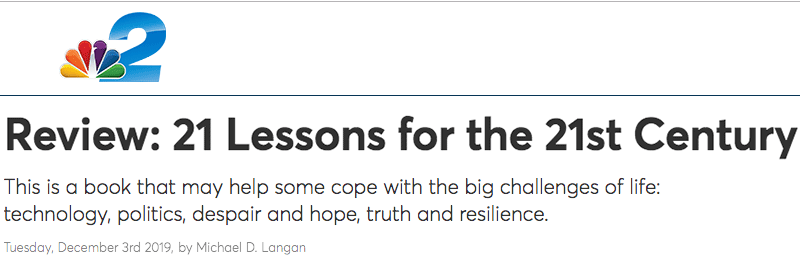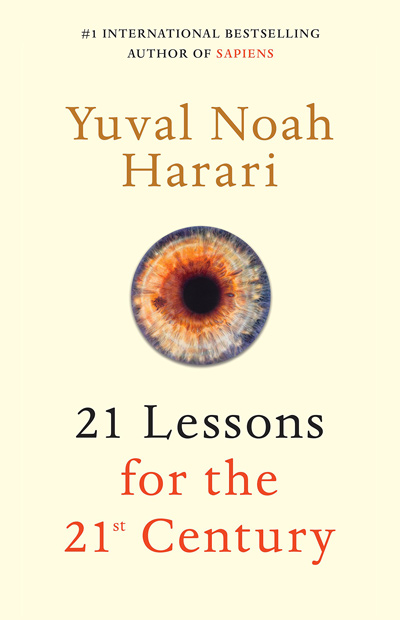Editor’s note: The first segment in CFHU’s new video series, Hebrew University Speaks featured Prof. Harari. His talk was titled: “Why Fascism is So Tempting – And How Your Data Could Power it.” Click here to watch it.


“21 Lessons for the 21st Century”
Yuval Noah Harari | Spiegel & Grau
384 pages $20.00
This is a book that may help some cope with the big challenges of life: technology, politics, despair and hope, truth and resilience.
About all these things, Harari writes that “in a world deluged by irrelevant information, clarity is power.” He’s clear about what he thinks important, but it’s up to you to buy what he puts on offer.
Yuval Noah Harari has a Ph.D. in history from the University of Oxford. (This sounds impressive, but he diminishes his achievement in the book, saying it was just about medieval soldiers.) Harari lectures at the Hebrew University of Jerusalem, specializing in world history. His earlier two books, “Sapiens: A brief History of Humankind” and “Homo Deus: A Brief History of Tomorrow”, were both global bestsellers with more than 15 million copies sold in more than fifty languages.
Harari writes clearly about big ideas, occasionally at war with one another. Harari’s prejudices are right out front for you to see. The reason for this: Harari wrote chapters of this book as articles for different periodicals. As a result there’s some dissonance in his overall vision.
Here’s Harari’s starting point. People love a good story, he says. For the reader, therefore, he offers what he calls “three grand stories that claimed to explain the whole past and to predict the future of the entire world: the fascist story, the communist story, and the liberal story.
Our author explains each: The fascist story tried to dominate by violently subduing all others. The communist story explained history as a struggle among classes, envisioning all united by a centralized social system that ensured equality at the price of freedom. And lastly, Harari notes, “the liberal story explained history as a struggle between liberty and tyranny, and envisioned a world in which all humans cooperate freely and peacefully, with a minimum central control even at the price of some inequality.”
The Second World War got rid of the fascist story. After that, the world became a battleground between the two remaining stories from the late 1940s to the late 1980s, when communism collapsed and the liberal story remained the beacon. As Harari writes: liberalism was the dominant guide to the human past and indispensable manual for the future of the world. Or so it seemed to the global elite. The global elite by definition are out for themselves.
Well, good luck to that apparent certitude by the elite about the future of liberalism. In 2019 we know that the liberal story is in trouble everywhere. But why, one asks? Doesn’t it seem crazy that freedom and peace and free enterprise should not be chosen by all? Who would be against “open roads, wide bridges, and bustling airports that replaced walls, moats, and barbed-wire fences?”
Harari agrees with this broad statement, arguing that the liberal story enabled people “to think for themselves and follow their hearts instead of blindly obeying bigoted priests and hide-bound traditions.”
The liberal story today, according to Harari, acknowledges that not all is well in the world. (No kidding, I’m thinking.)
When did liberalism begin to go wrong, our man asks rhetorically? His answer: it was the global financial crisis of 2008 where people became increasingly disillusioned with the liberal story. Other follow-ons made things worse: “the Brexit vote in England in 2016 and the rise of Donald Trump in the United States signified the moment when the tidal wave of disillusionment reached the core liberal states of Western Europe and North America.”
Liberalism can make a comeback, Harari says – if we deal in a realistic way with its challenges.
What are liberalism’s major challenges?
First, there is the threat of technologic disruption of world-wide economies. The liberal idea, remember, was shaped during the industrial era of steam engines, oil refineries and TV sets, Harari relates. It doesn’t seem able to handle ongoing revolutions in info tech and biotech. Most people, he claims, haven’t a clue about how to think about these areas. It leaves their development to scientists who think about systems, not people, first.
This claim doesn’t seem true to me. Harari claims that “because we didn’t understand the complexity of global ecology, the changes we made inadvertently disrupted the entire ecological system, and now we face a collapse.” Fact check: The United Nations has been warning of the coming calamity in global weather for years.
Is Harari kidding? There was no ‘inadvertence’ about it. We’ve broadly known global ecology’s complexity. This hasn’t stopped countries – especially the United States – from despoiling it for the last 30 years, particularly in the Trump era. Now Trump’s main message, Harari writes, “is that it’s not America’s job to formulate and promote any global vision whatsoever.”
Second, Harari notes that the masses now fear irrelevance. They are frantic to use their remaining power before it is too late. But, as he writes, it is much harder to struggle against irrelevance than against exploitation.
So what’s to be done? First, Harari say, be aware that the concept of Liberalism was never a single thing. For one person it means free elections, for another it indicates trade agreements, for a third it promotes gay marriage and abortion. It will not be easy to put people with contrasting interests together in a general agreement about all of these issues.
Today, our author writes, “the common person feels increasingly irrelevant.” How do TED Talks, think tanks, high-tech conferences, globalization, blockchain, genetic engineering, machine learning, concern them? No, is his answer.
So what remains? (Not much, in my view.)
In his last chapter, “Meditation”, he writes, “Just observe.” What does that mean? Harari relates that as a teenager, the world made no sense to him. He didn’t get any answers to the big questions he had about life.
“All I got from the people around me and the books I read were elaborate fictions: religious myths about gods and heavens, nationalist myths about the motherland and its historical mission, romantic myths about love and adventure, or capitalist myths about economic growth and how buying and consuming stuff would make me happy. I had enough sense to realize that these were probably all fictions, but I had no idea how to find the truth.”
It is at this point that Harari reprises his years of research into brain research and the value of meditation, which he practices two hours a day. Self- observation is hard, he says. But he thinks those who wish to do so still have a choice to investigate who they really are by meditation.
Do it now, he advises. I’ve got nothing against meditation. It has its many values.
But mediation is no world saver. A redevelopment of the concept of ‘liberalism’ and a belief in God would be my alternate choices as valuable lessons to exercise in the 21st century.
Michael D. Langan is the NBC-2.com Culture Critic. He has written for the BBC, The Dublin Review of Books, and numerous U.S. publications.